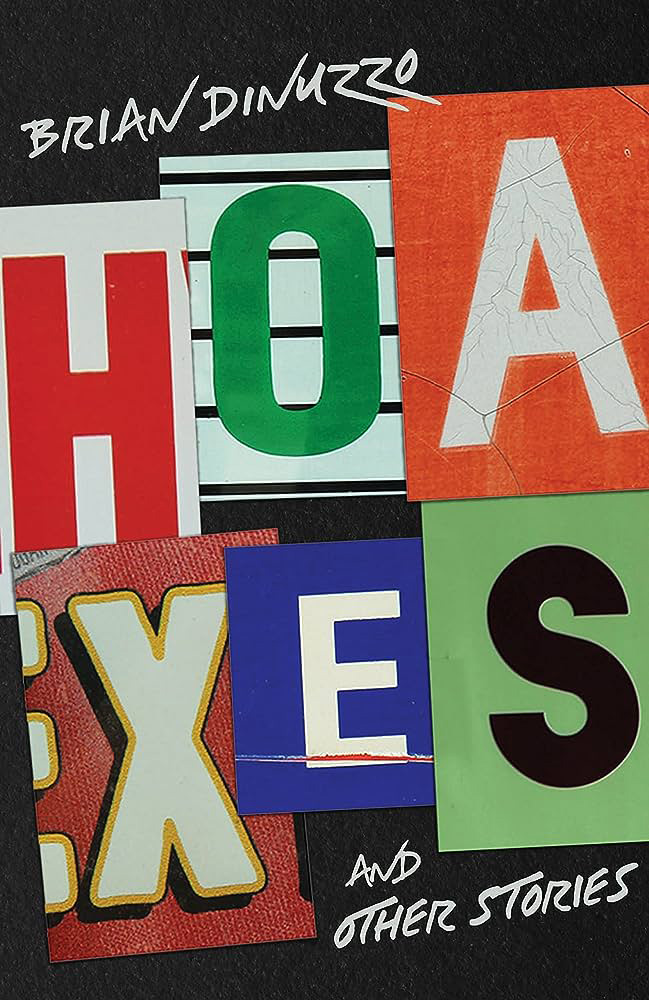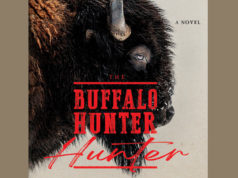Sometimes you read books that are powerful and evocative in a way you don’t see coming. Stuff that shakes you awake, challenges you, and — if you’re a writer — can even dwindle your best efforts, which is something you don’t like to (or won’t) admit.
Certain works can make you wonder why you ever picked up a pen or dived into a keyboard in the first place, not exactly paralyzing you but terrifying you and haunting you. Making you wonder if you’re wasting your time. Making you suspect that you’ll never get your heart or your mind or your soul down as profoundly or cleverly as the author.
I actually thought about this as I read Brian Dinuzzo’s Hoaxes and Other Stories. The Collin College English professor is not the first writer who ever gave me this impression or made me doubt my relevance or question my depth. He’s just the most recent.
Dinuzzo’s prose is elegant, intelligent, and razor’s-edge shrewd. Delightful (for me, anyway) and pleasantly jarring. I grabbed a copy of Hoaxes at the Lubbock Book Festival last year and (apologies, Brian) have only now just got around to reading it in its entirety.
In the titular story, an actor keeps encountering reports of his death, but he’s alive and well — or well — and the entire story revolves around recurring and increasingly bizarre accounts of his demise, which seem to coincide with the death of his human relationships and his career in Hollywood. It’s funny and somewhat distressing, and it’s a brilliant depiction of existential inanity. Which Tinseltown is so profoundly representative of.
Two more stories jump out. Occurring in one of the many dying malls in North Texas, “The Dying Mall” details the metaphysical and metaphorical quandary the phenomenon inspires in one male mall attendee, in particular, to comic and somewhat cosmic effect, while “A Hero’s Embrace” details a corporate “team-building” exercise that features a shocking, grim denouement that may cross the minds of many American corporate cogs, especially during their current slogs.
Real things are important but less urgent and less engaging without meaning or meaningfulness. And as our culture speeds toward multiplying products and processes with little or no intrinsic meaning or intellectual value, our own reality seems less urgent, and we increasingly ignore it, settling instead for virtual or viral half-measures of less consequence because they are in no way tied to the repercussions of the escapism and ignorance we embrace.
Speaking of hoaxes, the “hundredth monkey effect” is a hypothetical phenomenon in which a new behavior or concept is quickly spread via unexplained means from one group to all related, adjacent groups once a critical number of members of a seminal group exhibit the new behavior or acknowledge and embrace the new concept. The phenomenon was even said to spread to groups that are physically separated and have no obvious means of communicating with the phenomenon’s progenitors or perimeter ambassadors. The phenomenon and supporting studies of the phenomenon have long been dismissed as hoaxes, but I’m afraid the literal negative proves the positive.
We are surrounded by hoaxes. They lay at the foundation of our greatest institutions and, throughout the scope and breadth of human societies (in general), pervade every aspect of our lives. And we don’t care. We prefer them.
The hundredth monkey effect is now universally demonstrable and inviolate. We don’t want to call out the hoaxes or abandon our complacence or herd complicity. Like the matriarch in Flannery O’Connor’s “Everything that Rises Must Converge,” to embrace the real truth — or, perhaps better put, reality — would lead to individual, group, and, eventually, societal collapses.
But as Franz Kafka demurs, “We need the books that affect us like a disaster, that grieve us deeply, like the death of someone we loved more than ourselves, like being banished into forests far from everyone, like a suicide. A book must be the axe for the frozen sea inside us.”
Hoaxes and Other Stories suggests Brian Dinuzzo is a lumberjack on ice skates. It was not what I expected, and the promise and possibilities of Dinuzzo’s writing may be vast and uncharted.
E.R. Bills is the award-winning bestselling author of Nature Calls.
Hoaxes and Other Stories,
by Brian Dinuzzo
University of Wisconsin Press
161 pps.
$17.95












